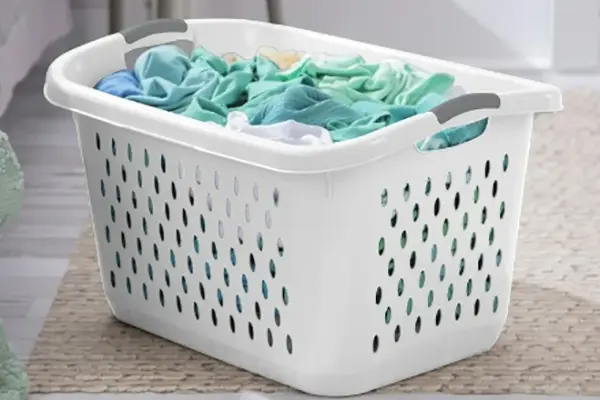Choosing the best material for a laundry basket is essential for ensuring functionality, durability, and convenience. With various options available, including plastic, wicker, metal, and fabric, each material offers unique benefits and drawbacks. This article explores these materials in detail, with a focus on why a plastic basket for laundry often emerges as a top choice.
Plastic Laundry Baskets
Advantages
- Durability: Plastic laundry baskets are known for their durability. They can withstand rough handling, drops, and heavy loads without breaking or cracking.
- Lightweight: Plastic baskets are significantly lighter than metal or wicker baskets, making them easy to carry around, even when full of clothes.
- Water Resistance: Unlike wicker or fabric baskets, plastic does not absorb moisture, which makes it ideal for handling wet clothes. This also means it’s easy to clean and resistant to mold and mildew.
- Affordability: Plastic baskets are generally more affordable than those made from other materials, making them a cost-effective choice for most households.
- Variety: Available in various sizes, shapes, and colors, plastic baskets can match any décor and fit into any space.
Disadvantages
- Aesthetics: Plastic baskets may not offer the same aesthetic appeal as wicker or fabric baskets. They can sometimes look less attractive and may not fit well with certain interior styles.
- Environmental Impact: While some plastic baskets are made from recycled materials, plastic production and disposal have a significant environmental impact.
Wicker Laundry Baskets
Advantages
- Aesthetic Appeal: Wicker baskets are often favored for their rustic and natural look, which can enhance the décor of a room.
- Breathability: The woven design of wicker baskets allows for better air circulation, which can help prevent odors from building up in dirty laundry.
Disadvantages
- Durability: Wicker is not as durable as plastic or metal. It can break or unravel over time, especially when exposed to heavy loads or moisture.
- Maintenance: Wicker baskets can be harder to clean and may develop mold or mildew if they get wet.
Metal Laundry Baskets
Advantages
- Strength and Durability: Metal baskets are incredibly strong and durable, capable of handling heavy loads without bending or breaking.
- Industrial Look: Metal baskets can add a modern, industrial touch to your home décor.
Disadvantages
- Weight: Metal baskets are heavier than plastic or fabric options, making them harder to carry when full.
- Corrosion: If not properly coated, metal baskets can rust, especially when exposed to moisture.
Fabric Laundry Baskets
Advantages
- Lightweight and Portable: Fabric baskets are lightweight and often come with handles or straps, making them easy to carry.
- Foldable: Many fabric baskets are collapsible, which is convenient for storage when not in use.
Disadvantages
- Durability: Fabric baskets are not as durable as plastic or metal. They can tear or wear out over time, especially with heavy use.
- Moisture Issues: Fabric can absorb moisture, which can lead to mold or mildew growth if not properly dried.
Why Plastic Baskets for Laundry Stand Out
Given the comparison, a plastic basket for laundry often stands out as the best option due to its combination of durability, affordability, and convenience. Here’s why:
- Versatility: Plastic baskets can be used for both dry and wet laundry, unlike fabric or wicker baskets which may suffer from mold or mildew when exposed to moisture.
- Ease of Maintenance: Plastic baskets are easy to clean, requiring only a simple wipe down or rinse.
- Practical Design: Many plastic baskets come with ergonomic designs, such as built-in handles and vent holes for air circulation, enhancing their functionality.
Conclusion
While each type of laundry basket material has its own set of advantages and disadvantages, plastic often proves to be the most practical choice for many households. Its durability, ease of maintenance, lightweight nature, and affordability make it a reliable and convenient option. However, the best choice ultimately depends on individual needs and preferences, including considerations of aesthetics, environmental impact, and specific use cases.
Post time: 07-31-2024




